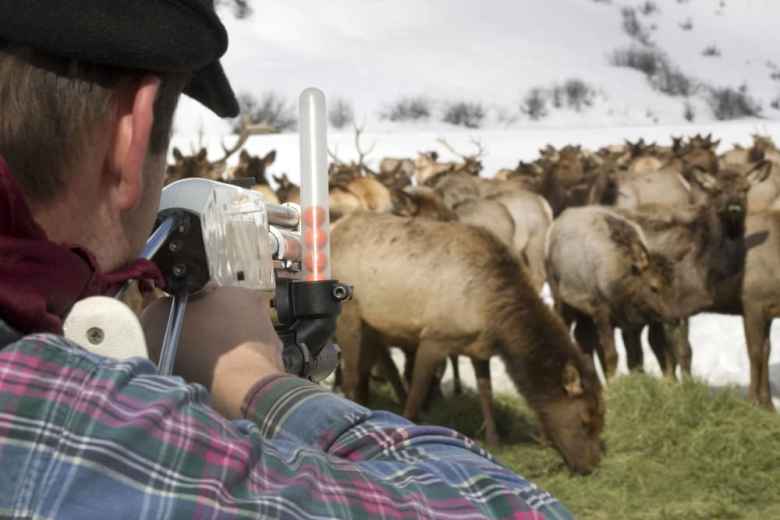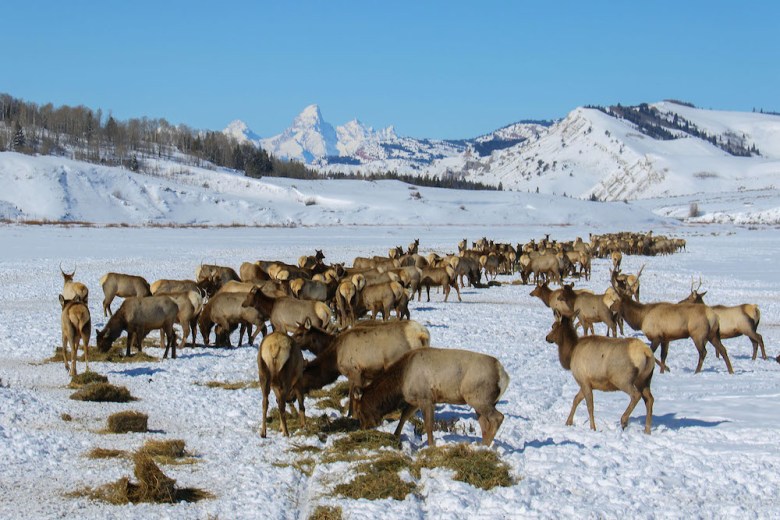I write to share a different perspective on many of the views expressed in WyoFile’s March 30 story, Legislature strips Game and Fish of elk feedground closure power.
I have been a hunter and a sportsman my entire life. I served as Wyoming Attorney General from 2002 to 2007. I just recently left the Wyoming Game and Fish Commission after having served six years. These experiences in the trenches give me a unique perspective on the issues addressed in the article and on the independent discretion of the commission and the department.
I believe that having an independent Game and Fish Department is critical for wildlife management in Wyoming. I have defended the autonomy of the commission and department for years. I will continue to do so.
I diverge from some of my fellow wildlife advocates on the effect of the feedground bill and on the status and independence of the department and commission, however. I also believe overly demanding and ill-advised wildlife advocacy has harmed the independence of the department and commission in the recent past.
I have been intimately involved with wildlife issues with the state’s last three governors. While serving as Gov. Dave Freudenthal’s attorney general and as a Game and Fish commissioner under Govs. Matt Mead and Mark Gordon, I have never seen any of these leaders attempt or try to limit the discretion of the department or commission. Since at least 2002, I can attest that no governor in Wyoming has attempted to interfere with the commission and department exercising their powers to manage wildlife based on sound science, concerted study and with the interests of wildlife and sportsmen guiding their actions.
The recent feedground bill does limit the unfettered discretion of the department and commission to close a feedground without a final decision by the governor. This limited removal of discretion does not trouble me. It does not trouble me because having been involved in wildlife issues for almost 20 years I know that the governor would be consulted about closing a feedground in any event. Landowners would be consulted in any event. If history holds true based on the last 20 years, a governor will not close a feedground without the sound advice and consent of the department and commission. The loss of absolute decisional authority on this limited issue does not trouble me because at the end of the day, nothing really changed with the passage of this bill.
I do not believe that the department or the commission will close a feedground in my lifetime. Feedgrounds are important to Wyoming. Without them, we would have far fewer elk. Elk’s ability to travel hundreds of miles for winter sustenance has been lost. There is really no choice but to provide supplemental feeding.
There are at least two feedgrounds — Forest Park and Dell Creek — that if closed would result in the starvation of thousands of elk. The elk have no other place to go, and those herds would die a miserable death the first winter no feeding was provided.
Closure of other feedgrounds would not have such a drastic effect of starving thousands of elk, but it would cause great trouble and further imperil our fragile mule deer herds.

Elk are survivors. They outcompete mule deer because they are bigger and do not cling to historic wintering areas like mule deer. If elk need to move to survive a bad winter, they will do so. If feeding operations cease, elk will occupy mule deer wintering areas to the great detriment of our struggling mule deer. Mule deer winter ranges are protected by continued supplemental feeding of elk.
Congregation of animals most certainly increases disease transmission. Even recognizing that, elk and mule deer congregate in large numbers on their winter ranges even without supplemental feeding. I have seen aerial photos of wintering elk that show thousands of elk in less than one half square mile. The recent alarm about elk feeding operations and disease transmission needs to be studied to try and limit the effect but it should not lead to the closure of feedgrounds. If the feedgrounds closed, elk will congregate by the thousands on natural winter range or private land and disease transmission will still occur.
In addition, one of the major reasons that feeding began was to help prevent elk from moving onto and feeding on private property and haystacks through the winter. Mixing cattle and large numbers of elk on private land would seriously erode landowner support for wildlife and dramatically increase the brucellosis problem. It is far better to provide supplemental feed and keep wintering elk and wintering cattle separated as much as possible.
People must always recognize that the Game and Fish Department manages a living wildlife resource that depends on habitat that is neither owned nor controlled by the commission. The commission owns less than 1% of the wildlife habitat in Wyoming. Much of the most important habitat, including crucial winter range, is owned by private landowners. The department must maintain great landowner relations to manage our wildlife.
The first closure of a feedground will occur because of federal action. Several feedgrounds are located on U.S. Forest Service or BLM land. Those federal agencies have become increasingly hostile toward feedgrounds in the past 10 years or so. I believe that in the next several years, a federal agency will deny Wyoming the permits necessary to operate a feedground on federal land. Granting the governor the final say on closure of a feedground will have no effect when a federal agency refuses to allow continued feeding on federal lands.
It is disingenuous for the Wyoming Outdoor Council, the Wyoming Wildlife Federation and Chris Madson to use the recent Migration Corridor Executive Order as an example of the usurpation of department and commission power. Having lived through that series of events, I believe that overzealous wildlife advocacy groups were primarily responsible for the issuance of the executive order.
Before issuance of the order, WOC and WWF and other groups lobbied the commission to object to any federal or state mineral lease that in any way touched a migration corridor. Their arguments were that all leases near migration corridors must be banned and all federal leasing must be stopped until years of additional study were undertaken on migrations corridors. There was no balance in their demands or recognition of practical realities.
The commission very smartly did not follow the demands of the groups, and instead developed a policy where the department looked at every lease; objected to any leases that totally bisected a corridor; and made recommendations for lease stipulations to require all surface use occur off the corridor for leases that might impact a corridor.
Support engaged civic commentary — donate to WyoFile today
This was a solid policy. The arguments of advocacy groups, however, excited the mineral industry, which went to the Legislature and sought removal of department and commission authority to designate migration corridors and make leasing recommendations to federal agencies. The result was the executive order, which removed some discretion from the wildlife agency best suited to make those designations and recommendations. The removal of that discretion is unfortunate but was the result of advocacy group actions and demands.
All wildlife management today must involve balance between a multitude of factors. The Game and Fish Department and Commission cannot always blindly take actions that will protect 100% of the wildlife. To do so and ignore Wyoming workers, Wyoming’s economy, Wyoming’s livelihood, the interests of Wyoming sportsmen and political reality would be stupid. Such blind actions would result in the removal of the substantial independence and discretion the department and commission enjoy today.



It is indeed a rare treat to read an article about an important news event that is written by someone not advocating an agenda and who actually knows what he/she is talking about. Well done Mr. Crank, and thank you for your insightful analysis.
Wyoming has gradually turned wildlife (elk) into livestock. We as a State need to gradually reverse this trend, even if that means fewer elk. Sure, we would suffer a loss of income (non res. license sales), but we could also reduce costs (feed lots, excess G & F employees, etc.). We have a whole bunch of ‘redshirts” driving around in new pickups all over our State and we need to ask ourselves “is the hunting and fishing better than it was 10 years ago?” Elk shouldn’t be a commodity and the G & F shouldn’t be a large for profit corporation
Well written and very informative. Thank you
Well written and presented… Thank you again Pat for continuing to contribute to sensible discourse. Wildlife management appears so simple to many and it is not. Wyoming Game & Fish has been a model for how we must do things. With mans encroachment on our native wildlife’s habitat it will be even more complex. I am a biologist by training and it sure would be cool if these critters are still around in as natural setting as is possible for our great grand kids to see. Let the wildlife biologists and managers do the job and keep the politicians out of it.
What is really amusing. in a sad way, is that someone from Wyoming is so ignorant of what is happening in the world and still believes there will be great grandkids around to “see wildlife”.
The further we can keep the wildlife biologists and “managers” away from wildlife the better the chance that some of them, at least, may survive this ongoing climate extinction caused worldwide by humans.